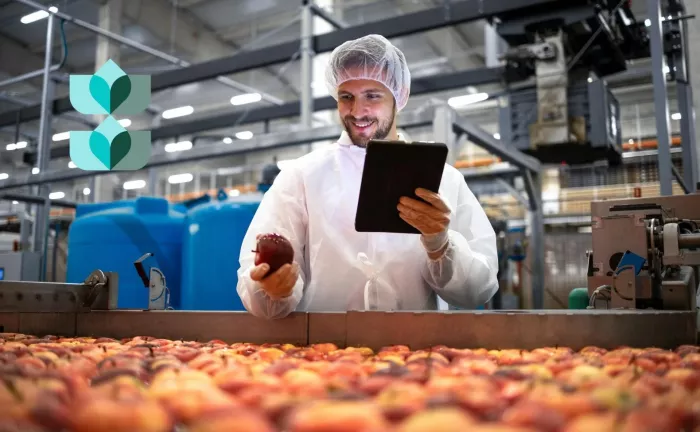In the fast-moving world of food production and distribution, managing the supply chain is no small feat. Between short shelf lives, ever-changing regulations, and unpredictable consumer demand, there’s little room for error. One delay or misstep can lead to wasted products, compliance issues, and lost revenue.
That’s why more and more food businesses are turning to ERP software for the food industry. These systems help centralize operations, improve visibility across departments, and make decision-making faster and smarter from the farm all the way to the fork.
In this blog, we’ll explore how ERP integration helps food businesses optimize their supply chains, reduce inefficiencies, and drive smarter, faster decision-making from farm to fork.
Understanding the Supply Chain Challenges in the Food Industry
The food industry faces unique supply chain hurdles that other sectors may not encounter, including:
- Short shelf lives for perishable products
- Regulatory compliance requirements (FDA, USDA, FSMA, HACCP)
- Demand volatility due to seasonality and consumer preferences
- Traceability needs from raw ingredients to end consumers
- Cold chain logistics and time-sensitive transportation
When even a small issue pops up in procurement, production, or distribution, it can ripple across the entire supply chain. And that’s why food businesses need more than spreadsheets and siloed tools; they need a centralized system that connects every piece of the puzzle.
The Role of ERP in Modern Food Supply Chains

Enterprise Resource Planning (ERP) systems provide a unified view of an organization’s processes, enabling real-time visibility, coordination, and control. In the context of food manufacturing and distribution, ERP systems integrate all supply chain functions to improve responsiveness and reduce friction.
When designed specifically for food businesses, like ERP software for food industry, these systems support:
- End-to-end traceability
- Recipe and batch control
- Inventory optimization
- Vendor and procurement management
- Production scheduling
- Logistics planning
- Quality assurance
- Demand forecasting
By aligning supply chain operations with ERP, food companies can address bottlenecks, make data-driven decisions, and improve service levels—all while maintaining full compliance.
Key Supply Chain Modules in Food ERP Software
Food ERP platforms typically include specialized modules tailored to industry-specific needs. When it comes to optimizing the supply chain, the following modules play a pivotal role:
1. Procurement and Vendor Management
- Automates purchase orders and tracks vendor performance
- Helps negotiate better terms based on historical data
- Ensures ingredient sourcing aligns with quality and compliance standards
2. Inventory and Warehouse Management
- Real-time inventory tracking across multiple warehouses
- FIFO/LIFO inventory control to reduce waste
- Automated alerts for stock-outs or overstocking
3. Production Planning and Scheduling
- Aligns production timelines with ingredient availability and order deadlines
- Reduces idle time and overproduction
- Supports custom recipes, batch scaling, and allergen control
4. Distribution and Logistics
- Route planning to optimize delivery schedules
- Cold chain monitoring and temperature tracking
- Automated shipment documentation and compliance handling
5. Traceability and Recall Management
- Tracks raw materials and finished goods throughout the supply chain
- Enables instant recall tracing to specific batches or ingredients
- Supports compliance with FSMA, GFSI, and HACCP standards
These modules work together to provide the core framework of supply chain management software for the food industry, driving efficiency and accuracy throughout every step.
Benefits of ERP-Integrated Supply Chains in the Food Industry
Adopting a food-specific ERP system helps businesses not only manage day-to-day operations but also proactively respond to emerging challenges. Here’s how ERP integration enhances supply chain performance:
Real-Time Visibility
ERP systems break down silos by integrating data across departments. Managers can track inventory levels, incoming shipments, and production status in real time, allowing for quicker decision-making and better planning.
Improved Forecasting and Planning
AI-powered ERP systems can analyze historical data, market trends, and seasonal shifts to generate accurate demand forecasts. This leads to better procurement decisions and reduced waste due to overproduction.
Enhanced Traceability and Compliance
ERP-enabled traceability systems ensure that all ingredients and products are tracked from origin to delivery. This transparency simplifies compliance reporting and ensures rapid response during recalls.
Reduced Operational Costs
With better planning, optimized routes, and automated workflows, companies can reduce waste, lower transportation costs, and minimize stockouts or surplus inventory.
Better Supplier Collaboration
A centralized ERP system allows food businesses to collaborate more effectively with suppliers by sharing forecasts, delivery timelines, and quality expectations—all within one platform.
Faster Order Fulfillment
Integrated logistics and inventory tools help ensure that orders are processed and fulfilled faster, leading to higher customer satisfaction and reduced delivery delays.
Real-World Use Case: ERP in Action
A mid-sized organic snack producer implemented a food-specific ERP system to streamline its growing supply chain. Before ERP, the business struggled with manual inventory tracking, frequent stockouts, and production scheduling delays.
Post-implementation, the company achieved:
- 35% reduction in inventory waste
- 40% faster order fulfillment
- Real-time ingredient traceability from suppliers to end customers
- Seamless integration of procurement, warehousing, and logistics
This is just one example of how ERP software for the food industry can transform supply chain outcomes in real-world settings.
Why Folio3 FoodTech?
Folio3 FoodTech is a leading provider of end-to-end ERP solutions for food manufacturers, processors, and distributors. Their system is built to address the nuances of the food industry, from compliance to cold chain management.
What makes Folio3 FoodTech stand out?
- Tailored Modules: Purpose-built ERP modules for production, quality, inventory, and logistics.
- Supply Chain Focus: A powerful supply chain management software for food industry that streamlines procurement, transportation, and fulfillment.
- Advanced Analytics: Built-in BI tools to forecast demand and monitor KPIs in real time.
- Cloud-Ready: Scalable and accessible from anywhere, supporting remote and multi-location operations.
- Compliance-First: Meets regulatory standards, with features like lot tracking, expiry management, and automated recall systems.
With Folio3, food companies can confidently scale operations while maintaining full control of their supply chains.
Final Thoughts: The Future of Food Supply Chains
In a world where food safety, sustainability, and speed are paramount, optimizing the supply chain is non-negotiable. A modern, integrated ERP solution built for the food industry is no longer a luxury it’s a strategic asset.
By adopting ERP software for the food industry, companies can automate complex processes, adapt to market changes, and stay compliant, all while delivering high-quality products to customers on time.
And with industry leaders like Folio3 FoodTech, food businesses gain more than just software they gain a strategic partner committed to their long-term success.



Ahmed Abdulla
Apr 24, 2025Dear Sir/ma, We are a financial services and advisory company mandated by our investors to seek business opportunities and projects for possible funding and debt capital financing. Please note that our investors are from the Gulf region. They intend to invest in viable business ventures or projects that you are currently executing or intend to embark upon as a means of expanding your (their) global portfolio. We are eager to have more discussions on this subject in any way you believe suitable. Please contact me on my direct email: [email protected] Looking forward to working with you. Yours faithfully, Ahmed Abdulla financial advisor Dejla Consulting LLC